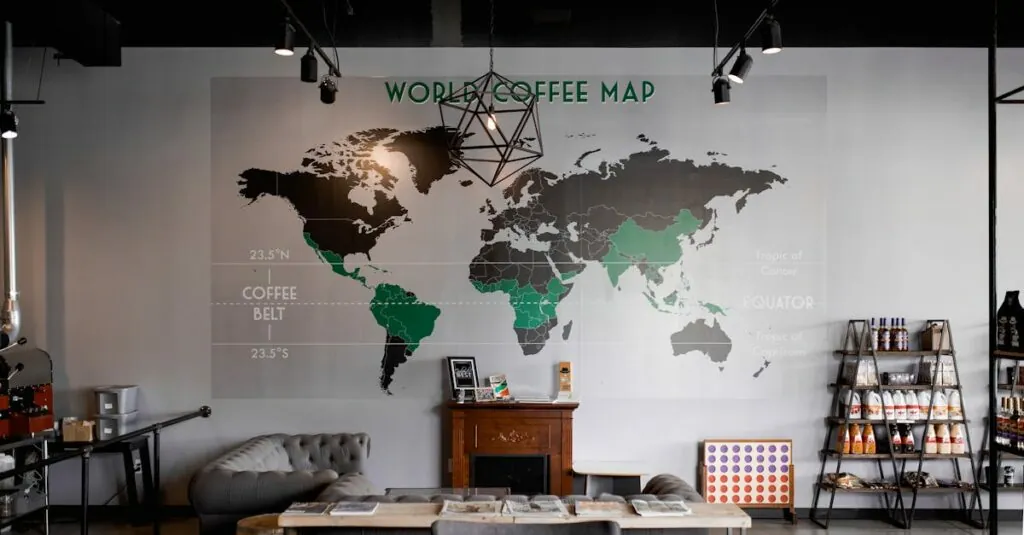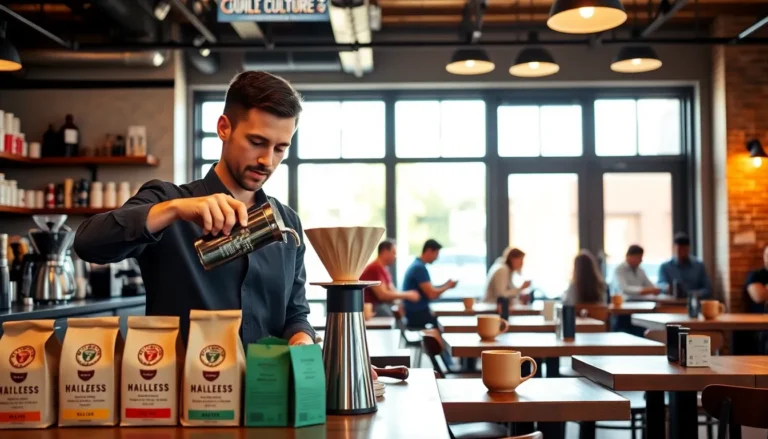Coffee isn’t just a drink; it’s a global phenomenon that fuels conversations, creativity, and even the occasional existential crisis. From the bustling cafés of Paris to the tranquil tea houses of Kyoto, this beloved brew weaves its way into the fabric of cultures worldwide. It’s the magical potion that transforms sleepy mornings into productive days and awkward first dates into memorable encounters.
But beyond the caffeine kick, coffee tells stories. It reflects traditions, rituals, and the unique quirks of communities. Whether it’s a rich espresso in Italy or a spiced chai in India, each cup serves as a passport to a different world. So, grab your favorite mug and join the journey as we explore how coffee shapes cultures and connects people in ways that are both delightful and downright hilarious.
Table of Contents
ToggleThe Significance of Coffee in Different Cultures
Coffee transcends being just a drink; it embodies traditions, connections, and rituals that enrich cultural interactions worldwide.
Historical Overview
Coffee originated in Ethiopia, where legend attributes its discovery to a goat herder named Kaldi. From Ethiopia, coffee spread to the Arabian Peninsula by the 15th century. The first coffee houses appeared in Constantinople during the 16th century, becoming hubs for intellectual discussions and socializing. By the 17th century, coffee had established itself as a commodity in Europe. Coffeehouses in England promoted political discourse, while in France, they became centers for art and literature. This historical journey reflects coffee’s ability to unite people across time and space.
Regional Variations
Cultural practices surrounding coffee vary significantly across the globe. In Italy, espresso represents a daily ritual with dedicated preparation techniques. Turks favor a unique brewing method called cezve, where coffee grounds and water mix during the cooking process. Ethiopian coffee ceremonies highlight hospitality, involving multiple rounds of brewing and sharing with guests. Chai, prevalent in India, blends tea with spices, reflecting regional flavors. These variations illustrate how local customs shape coffee consumption and community experiences, reinforcing its role as a cultural cornerstone.
Coffee Rituals and Traditions
Coffee serves as a vessel for cultural expression around the globe, showcasing unique rituals that enrich community bonds. These ceremonies not only highlight the beverage’s importance but also reflect local customs and traditions.
Coffee Ceremonies Around the World
Ethiopian coffee ceremonies stand out as a focal point for community gatherings. During this ritual, beans are roasted, ground, and brewed in a traditional pot called a jebena, allowing participants to savor the aromatic experience together. In Turkey, the cezve method emphasizes the art of brewing, as finely ground coffee simmers in a special pot, creating a rich and intense flavor. The careful preparation of Greek coffee involves a similar approach, where sugar can be added during brewing for sweetness. Each of these ceremonies emphasizes participation, turning coffee brewing into a shared social experience that strengthens relationships.
Social Aspects of Coffee Consumption
Global coffee culture thrives on social interaction and community building. Coffeehouses often serve as communal hubs, providing space for conversation and collaboration. In Italy, the quick espresso shot fuels conversations among friends, while in Brazil, long coffee breaks foster camaraderie in the workplace. Cultural nuances also play a role; for instance, sharing a cup of coffee in Middle Eastern countries signifies hospitality and respect. These shared moments transform coffee from a mere beverage into a vital part of daily life, shaping relationships and enriching cultural narratives.
The Impact of Coffee on Daily Life
Coffee plays a central role in daily routines and social interactions around the world. Its influence extends beyond mere consumption, blending into the cultural fabric of communities.
Coffee as a Catalyst for Community
Coffee serves as a vital social connector. In many cultures, communal coffee consumption fosters relationships and builds camaraderie. Coffeehouses function as meeting spots, where people gather to share ideas and stories. Ethiopian coffee ceremonies often involve family and friends, emphasizing connection. In Turkey, preparing coffee for guests highlights hospitality, reinforcing social ties. Through these shared moments, coffee creates a sense of belonging, enriching community dynamics.
Influence on Work and Productivity
Coffee significantly impacts work environments and productivity levels. Studies show a correlation between moderate coffee consumption and increased focus. Many professionals rely on coffee to enhance alertness and concentration while tackling tasks. In offices, coffee breaks offer employees a chance to recharge and collaborate. These breaks stimulate creativity and foster a sense of teamwork. With its energizing effects, coffee cultivates a conducive atmosphere for productivity in various work settings.
Coffee and Art
Coffee serves as a muse for countless artists and creatives. Many find inspiration in its aroma, flavors, and the communal experience surrounding it.
Creative Expressions Inspired by Coffee
Artists often incorporate coffee into their work, whether through actual coffee paintings or the themes expressed in their creations. Visual artists use coffee as a medium due to its unique staining properties, resulting in evocative, textured pieces. Musicians and writers frequently gather in coffeehouses, transforming these environments into incubators for new ideas and collaborations. Performances and readings held in these spaces showcase the integral role coffee plays in the artistic process.
Literature and Coffee Culture
Literature often weaves coffee into its narrative fabric. Writers describe coffee as a catalyst for creativity, where characters engage in profound conversations over steaming cups. Literary cafes serve as landmarks in many cities, hosting renowned authors and fostering intellectual discourse. Classics like “The Paris Café” highlight the connection between coffee culture and literary movements. Many authors attribute their work’s genesis to the buzz and ambiance of coffeehouses, underscoring how coffee enriches the literary landscape.
Coffee transcends its role as a mere beverage to become a vital part of cultural identity. It fosters connections and ignites creativity while serving as a backdrop for countless social interactions. From the bustling coffeehouses of Europe to intimate Ethiopian ceremonies, coffee cultivates community and enriches daily life.
As it continues to inspire artists and thinkers, coffee remains a powerful symbol of hospitality and shared experiences. Its influence on culture is undeniable, weaving together traditions and stories that resonate across generations. Embracing coffee’s rich heritage invites everyone to appreciate its role in shaping relationships and enhancing the human experience.



